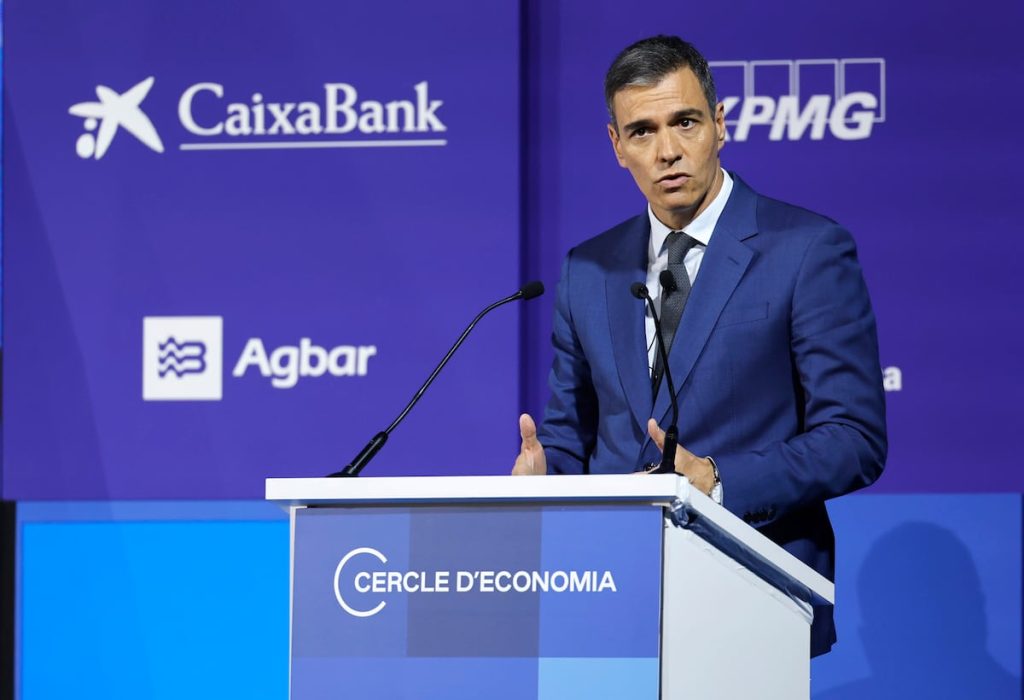The annual meeting of the influential Circle of Economy is perhaps the best barometer over the years of the relationship between the Catalan and central political and economic powers of Madrid. Seeing how the President and the opposition leader are received here, who almost always come, is a way to analyze who is strong, at least for the Catalan business community, and which discourse is more popular in the heart of historically powerful Spanish bourgeoisie. If Alberto Núñez Feijóo was enthusiastically received in 2022, when shortly after taking over the leadership of the PP he spoke here of the “Catalan nation”, and last year, in the middle of the electoral campaign, he also triumphed by promising tax cuts when almost all polls said he would go to La Moncloa, this year it was clearly Pedro Sánchez who received the accolades, while the leader of the PP received a clear indifference on Thursday with a very tough speech, almost identical to the one he gives in Madrid, that opened no doors in Catalonia and also showed support for a pact with the far-right Giorgia Meloni.
The businessmen of the Circle of Economy seem happy with the end of the pro-independence movement that the Catalan elections represented, and they have openly told Sánchez. The president of the Circle, Jaume Guardiola, openly praised the “courage” of the president not only with the pardons, which the Circle supported after much internal debate, but also with the amnesty, criticized by the PP, although he asked him to seek agreement with the opposition. And Sánchez, who as always receives a much friendlier treatment in Catalonia than in Madrid, his birthplace, appeared very comfortable and promised to solve the two main pending issues, the financing reform and better infrastructures. Guardiola’s speech, and the questions he asked Sánchez after, were a very clear example of the shift that has occurred in Catalonia and the open gratitude that the business community has towards Sánchez. But even more evident were the conversations in the corridors, where the criticisms of Feijóo’s speech from the previous day were the norm, while Sánchez did what many expected: talk positively about the new situation that opens up after the independence movement lost the majority.
Guardiola was very clear in a speech representing the entire Circle: “We are leaving behind the convulsive and painful moments we have experienced. The institutional normalization that Catalonia has regained is largely related to your government action. And we want to thank you for it. The Circle supported the pardons. And after a thorough discussion, we understood the amnesty law as a risky but constructive opportunity. We would have liked it to have more consensus, and a more moderate attitude on the part of the beneficiaries. But we think that amnesty is an opportunity to close a sterile period. In this climate of enormous tension, whose purpose is to delegitimize your presidency, in addition to the resistance manual, you have shown courage when making decisions. Some may find it audacious. We find it courageous. That is why we appeal to this courage to reform the financing system and also for the reconstruction of a space for dialogue and negotiations with the opposition that the president must lead,” he said.
Sánchez, visibly pleased with the reception in Barcelona, also responded in kind. “I also want to thank the Circle. Because when it was most needed, it supported dialogue, coexistence and encounter. You were right, we were right. The Circle has played a fundamental role in overcoming one of the biggest political and coexistence crises. Now, after the elections, Catalonia will be involved in the progress of Spain and will lead an open Europe”. From there, the president made his offer to Catalonia to regain momentum. He first insisted that Salvador Illa, who was in the front row, will be the president. “There is no majority without the PSC. All roads lead to Illa and reaching Illa. The Government will be decided in Catalonia and will obey Catalan needs”. In the corridors, almost no one was betting on a repeat election, although there is still time to see what ERC will decide and in the middle are the European elections, which are also relevant for that decision. But above all, Sánchez promised to improve funding and infrastructure, the two historical demands in Catalonia, in addition to guaranteeing absolute respect for the Catalan language, which can now be openly spoken in the Congress after agreements with ERC and Junts.
Sánchez also won the approval of the businessmen, tired of the pro-independence movement, when he recalled that in 2017, because of that crisis, Barcelona lost the opportunity to host the European Medicines Agency. “A thousand senior officials would have come, with a budget of 400 million euros annually. A key accelerator for the pharmaceutical industry, which is very relevant in Catalonia. Barcelona had unbeatable conditions. And now, on the contrary, Moody’s confirms that the election results in Catalonia reduce risks and encourage investment. That’s called confidence. Entrepreneurs know how difficult it is to earn it and how easy it is to lose it,” he exclaimed to put an end to the process. Madrid-born Sánchez confirms that Catalonia is the most comfortable place for him, even among the always wary business community. But now he is in the midst of the European election campaign and also needs a strong mobilization of the left throughout Spain to prevent the PP from achieving great success on June 9th and giving wings to the opposition.


